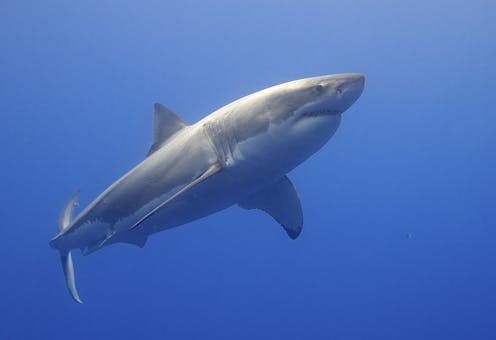White sharks can easily mistake swimmers or surfers for seals. Our research aims to reduce the risk
- Written by Laura Ryan, Postdoctoral Researcher, Department of Biological Sciences, Macquarie University

The presumed death of 57-year-old Paul Millachip[1] in an apparently fatal shark bite incident near Perth on November 6 is a traumatising reminder that while shark bites are rare, they can have tragic consequences.
Despite the understandably huge media attention these incidents generate, there has been little scientific insight into how and why they happen.
Sharks in general, and white sharks in particular, have long been described as “mindless killers[2]” and “man-eaters[3]”.
But our recent research[4] confirms that some bites on humans may be the result of mistaken identity, whereby the sharks mistake humans for their natural prey based on visual similarities.
Sharks have an impressive array of senses, but vision is thought to be particularly important for prey detection in white sharks. For example, they can attack seal-shaped decoys at the surface of the water even though these decoys lack other sensory cues such as scent.
The visual world of a white shark varies substantially from that of our own. White sharks are likely colourblind and rely on brightness, essentially experiencing their world in shades of grey. Their eyesight is also much less acute than ours – in fact, it’s probably more akin to the blurry images a human would see underwater without a mask or goggles.
The mistaken identity theory
Bites on surfers have often been explained by the fact that, seen from underneath, a paddling surfer looks a lot like a seal. But this presumed similarity has only previously been assessed based on human vision, using underwater photographs to compare their silhouettes.
Recent developments in our understanding of sharks’ vision have now made it possible to examine the mistaken identity theory from the shark’s perspective, using a virtual system that generates “shark’s-eye” images.
In our study, published last month[5], we and our colleagues in Australia, South Africa and the United Kingdom compared video footage of seals and of humans swimming and paddling surfboards, to predict what a young white shark sees when looking up from below.
We specifically studied juvenile white sharks – between of 2m and 2.5m in length – because data[6] from New South Wales suggests[7] they are more common in the surf zone and are disproportionately involved in bites on humans. This might be because juvenile sharks are more likely to make mistakes as they switch to hunting larger prey such as seals.
Our results showed it was impossible for the virtual visual system to distinguish swimming or paddling humans from seals. This suggests both activities pose a risk, and that the greater occurrence of bites on surfers[8] might be linked to the times and locations of when and where people surf.
Our analysis suggests the “mistaken identity” theory is indeed plausible, from a visual perspective at least. But sharks can also detect prey using other sensory systems, such as smell, sound, touch and detection of electrical fields.
Read more: Why do shark bites seem to be more deadly in Australia than elsewhere?[9]
While it seems unlikely every bite on a human by a white shark is a case of mistaken identity, it is certainly a possibility in cases where the human is on the surface and the shark approaches from below.
However, the mistaken identity theory cannot explain all shark bites and other factors, such as curiosity, hunger or aggression are likely to also explains some shark bites.
Can this knowledge help protect us?
As summer arrives and COVID restrictions lift, more Australians will head to the beach over the coming months, increasing the chances they might come into close proximity with a shark. Often, people may not even realise a shark is close by. But the past weekend gave us a reminder that shark encounters can also tragically result in serious injury or death.
Understanding why shark bites happen is a good first step towards helping reduce the risk. Our research has inspired the design of non-invasive, vision-based shark mitigation devices that are currently being tested, and which change the shape of the silhouette.
Read more: Fatal shark attacks are at a record high. 'Deterrent' devices can help, but some may be nothing but snake oil[10]
We still have a lot to learn about how sharks experience their world, and therefore what measures will most effectively reduce the risks of a shark bite. There is a plethora of devices being developed or commercially available, but only a few of them have been scientifically tested, and even fewer – such as the devices made by Ocean Guardian[11] that create an electrical field to ward off sharks – have been found[12] to genuinely reduce the risk of being bitten.
References
- ^ presumed death of 57-year-old Paul Millachip (www.abc.net.au)
- ^ mindless killers (www.news-press.com)
- ^ man-eaters (www.walesonline.co.uk)
- ^ recent research (royalsocietypublishing.org)
- ^ published last month (royalsocietypublishing.org)
- ^ data (www.frontiersin.org)
- ^ suggests (www.hindawi.com)
- ^ greater occurrence of bites on surfers (www.publish.csiro.au)
- ^ Why do shark bites seem to be more deadly in Australia than elsewhere? (theconversation.com)
- ^ Fatal shark attacks are at a record high. 'Deterrent' devices can help, but some may be nothing but snake oil (theconversation.com)
- ^ Ocean Guardian (ocean-guardian.com.au)
- ^ found (peerj.com)

















